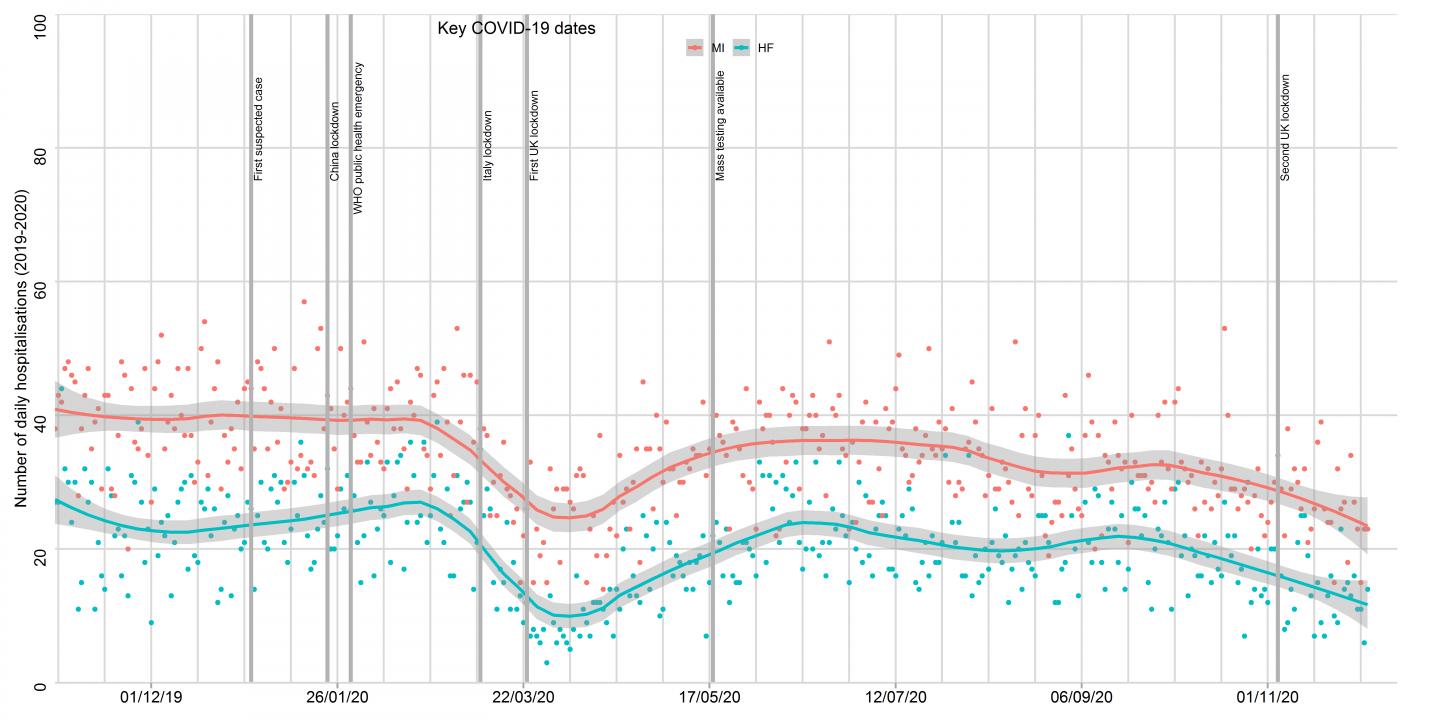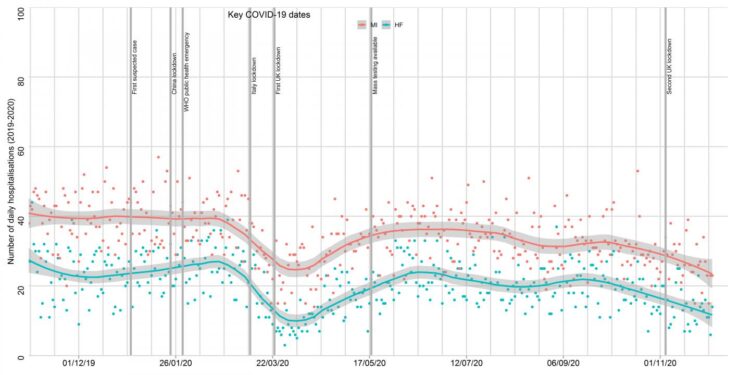
Credit: University of Leeds
Data analysis is revealing a second sharp drop in the number of people admitted to hospital in England with acute heart failure or a heart attack.
The decline began in October as the numbers of COVID-19 infections began to surge ahead of the second lockdown, which came into force in early November.
The findings, from a research group led by the University of Leeds, have been revealed in a letter to the Journal of the American College of Cardiology.
The decline – 41 percent fewer people attending with heart failure and 34 percent with a heart attack compared to pre-pandemic levels – is approaching the size of that observed during the first wave of the pandemic. The researchers believe the drop in people seeking emergency medical help for cardiovascular emergences in the first wave of the pandemic may have contributed to more than 2,000 excess deaths in England and Wales.
In the letter to the journal, the scientists note: “The second dip appears of similar magnitude to that of the first, and signals that the public are fearful of attending hospital despite having medical emergencies…”
Chris Gale, Professor of Cardiovascular Medicine at Leeds, who supervised the data analysis, said: “I am afraid that we are seeing a re-run of one of the preventable tragedies of the first wave – people were either too afraid to go to hospital for fear of contracting COVID-19 or were not referred for treatment.
“The message to patients needs to be clear. If they experience symptoms of a heart attack or acute heart failure, they need to attend hospital. These are unforgiving medical emergencies. With the right help, people can recover from them. But if patients delay or avoid treatment, their will suffer life-limiting complications – or they will die.”
Dr Jianhua Wu, Associate Professor at the University of Leeds, led the analysis. He said: “One of the worrying aspects of our research is that the decline we have seen since October may not have yet bottomed out. Inevitably there is a fear that will result in deaths that perhaps could have been avoided.”?
Professor Simon Ray, President of the British Cardiovascular Society, added: “This research illustrates again the importance of the message that other medical problems don’t stop because of COVID and that people with serious problems like heart attack and acute heart failure still need to be seen and treated urgently to prevent death or long-term ill health.”
The data analysis
Data on the daily admission to hospital of people suffering acute heart failure or a heart attack is recorded on a national research database, the National Institute for Cardiovascular Outcomes Research. The researchers compared daily admission rates before the pandemic with what happened during the first wave of the pandemic and then at the start of the second lockdown in England. The data was drawn from 66 hospitals.
Please see the attached time series graph.
The second lockdown
From the beginning of October to 17 November 2020, the daily number of people attending hospital emergency units with heart failure dropped 41 percent – and for heart attack, the decline was 34 percent.
Since submitting their data analysis to the journal, the research team have received more up to date figures, which includes patient data for the whole of November, and it reveals a continuing drop in patient attendances.
The first lockdown
Patient attendances began to drop ahead of the first lockdown, from 23 March 2020, and reached their lowest point in early April, with 54 percent fewer people attending hospital emergency units with heat failure, and 32 percent with a heart attack. Patient numbers did rebound towards the latter half of June but did not return fully to pre-pandemic levels.
###
Notes to editors
For further information and for requests to talk to Professor Gale, please contact David Lewis in the media office at the University of Leeds – [email protected] or +44 (0)7710 013287
University of Leeds
The University of Leeds is one of the largest higher education institutions in the UK, with more than 38,000 students from more than 150 different countries, and a member of the Russell Group of research-intensive universities. The University plays a significant role in the Turing, Rosalind Franklin and Royce Institutes.
We are a top ten university for research and impact power in the UK, according to the 2014 Research Excellence Framework, and are in the top 100 of the QS World University Rankings 2020.
The University was awarded a Gold rating by the Government’s Teaching Excellence Framework in 2017, recognising its ‘consistently outstanding’ teaching and learning provision. Twenty-six of our academics have been awarded National Teaching Fellowships – more than any other institution in England, Northern Ireland and Wales – reflecting the excellence of our teaching. http://www.
Media Contact
David Lewis
[email protected]





